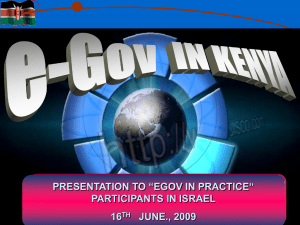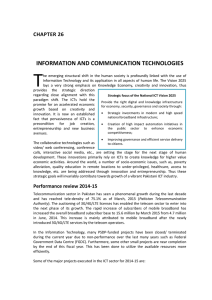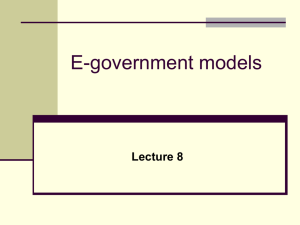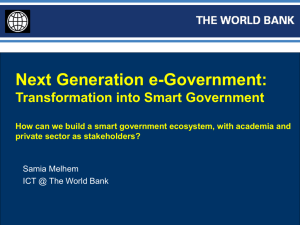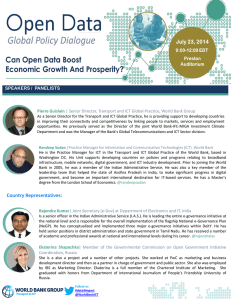Ronneby 2004-09-03 Pirjo Elovaara Project Leader
advertisement
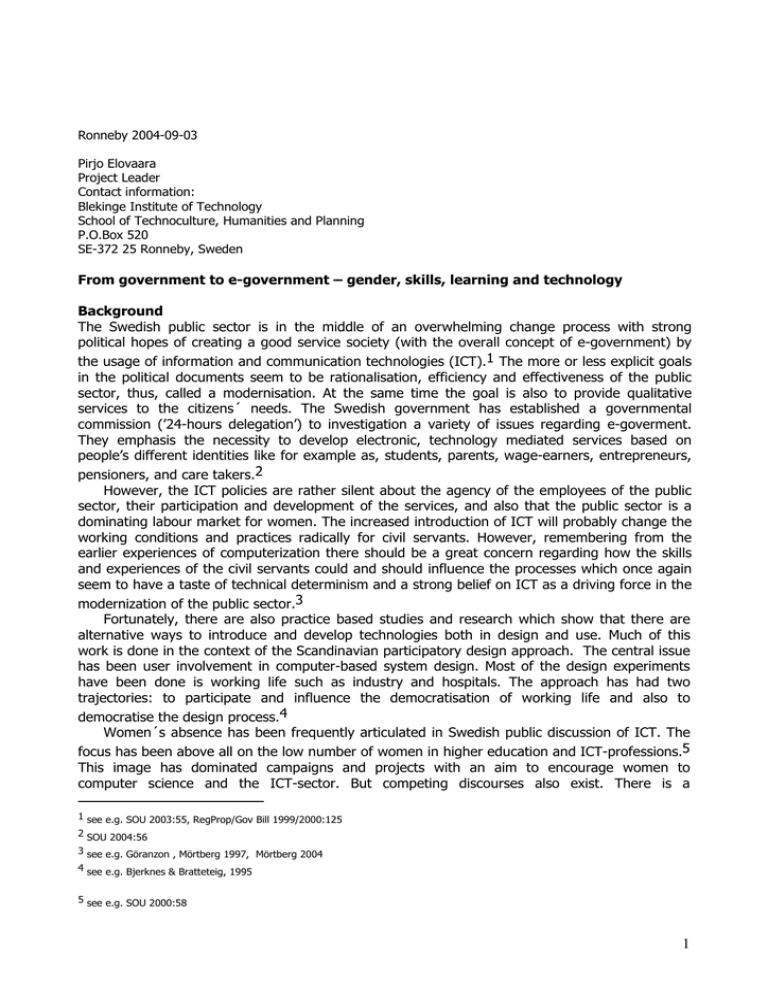
Ronneby 2004-09-03 Pirjo Elovaara Project Leader Contact information: Blekinge Institute of Technology School of Technoculture, Humanities and Planning P.O.Box 520 SE-372 25 Ronneby, Sweden From government to e-government – gender, skills, learning and technology Background The Swedish public sector is in the middle of an overwhelming change process with strong political hopes of creating a good service society (with the overall concept of e-government) by the usage of information and communication technologies (ICT).1 The more or less explicit goals in the political documents seem to be rationalisation, efficiency and effectiveness of the public sector, thus, called a modernisation. At the same time the goal is also to provide qualitative services to the citizens´ needs. The Swedish government has established a governmental commission (’24-hours delegation’) to investigation a variety of issues regarding e-goverment. They emphasis the necessity to develop electronic, technology mediated services based on people’s different identities like for example as, students, parents, wage-earners, entrepreneurs, pensioners, and care takers.2 However, the ICT policies are rather silent about the agency of the employees of the public sector, their participation and development of the services, and also that the public sector is a dominating labour market for women. The increased introduction of ICT will probably change the working conditions and practices radically for civil servants. However, remembering from the earlier experiences of computerization there should be a great concern regarding how the skills and experiences of the civil servants could and should influence the processes which once again seem to have a taste of technical determinism and a strong belief on ICT as a driving force in the modernization of the public sector.3 Fortunately, there are also practice based studies and research which show that there are alternative ways to introduce and develop technologies both in design and use. Much of this work is done in the context of the Scandinavian participatory design approach. The central issue has been user involvement in computer-based system design. Most of the design experiments have been done is working life such as industry and hospitals. The approach has had two trajectories: to participate and influence the democratisation of working life and also to democratise the design process.4 Women´s absence has been frequently articulated in Swedish public discussion of ICT. The focus has been above all on the low number of women in higher education and ICT-professions.5 This image has dominated campaigns and projects with an aim to encourage women to computer science and the ICT-sector. But competing discourses also exist. There is a 1 see e.g. SOU 2003:55, RegProp/Gov Bill 1999/2000:125 2 SOU 2004:56 3 see e.g. Göranzon , Mörtberg 1997, Mörtberg 2004 4 see e.g. Bjerknes & Bratteteig, 1995 5 see e.g. SOU 2000:58 1 predominance of women working as librarians in Sweden. Mostly librarians do not have the same right to speak about information technology compared with for example systems designers, programmers or system administrators. By creating room, interpellating and giving librarians space to reflect upon ICT, how they use ICT, and how they express theirs expectations, dreams and visions, other meanings than those based on women’s absence in the field of ICT can be shaped. 6 Futhermore, in the middle and end of 1990s feminist researchers pointed out breaks and fissures also in the male dominance of systems development in Sweden.7 The dominating public discussions focus still is on women’s absence in educations and professions in the ICTsector despite competing discourses and ICT-images. Other parallel ICT-based development processes are taking place in the Swedish society. These processes express more powerfully the need to gain new qualifications and knowledge of the citizens in different actor positions, but also to create learning processes where people are trying to identify and shape their own place and role in the changing society. Explicitly this might be expressed as ideas of the ´open university´ as its goal to create entries for people without the ordinary formal qualifications but instead with working life skills and/or other societal experiences. Many higher educational institutions are not only trying to reshape their pedagogical forms but also the very understandings of knowledge, and where the field of distance education8 seems to be the field where these efforts are most explicit. Many of the ideas connected to distance learning have their roots in critical and feminist pedagogy with a focus on empowerment and non-authoritarian ways of working. The steering principles of feminist pedagogy are: "empowerment, reflexivity, power, and participation".9 Distance learning with the use of ICT demands efforts to keep these principles alive since it is much more individualized than classroom teaching.10 Other aspects that one needs to be aware of is what Sara Goodman emphasis as following: "The sensual interaction that allows a teacher to use sensibility is diminished in distance education".11 The starting point has been and still is on the situated lives of the participants.12 Aim of the project In the brief introductory background chapter the intention has been to frame the field of tension where political ICT-dreams, visions and hopes of the future Swedish public sector, the absence of the civil servants as active and skilful change agents, , the field of ICT-mediated education shaping more space for individuals and their possibilities in the change processes, seem to be the counter partners. But, the relation gender and technology is mutual created and takes particular forms in certain times, cultures and places.13 In the crossroads between possibilities and risks of the expanding ICT-mediated society and working life the aim of the research is to study learning and knowledge processes among women employed in the Swedish public sector in change Further the aim is also to develop and test different forms of support for learning and knowledge processes connected to the work and ICT-development in the public sector. The focus will be on 6 Elovaara, 2002, 2004 7 Blomqvist 1994, Roman 1994, Mörtberg 1997 8 Distance education used here synonymously with net based learning, e-learning, flexible learning 9 Goodman et al 2003, 10 Goodman et al 2003 11 Goodman et al 2003:102 12 See Vehviläinen 1997, Goodman et al 2003 13 Vehviläinen 2001 2 how to design and use a web based distance education can be used as a way to support situated learning. The specific context is the region of Blekinge, southeast Sweden. The project intends to create an arena of/for action for local re-negotiations of ICT and gender where the design perspective (including both technology and education) together with learning and knowledge processes within e-government will be weaved together. Gender will be analysed as a heterogeneous category (or power asymmetry) and not as given that is something that is shaped and constituted in space and time. Thus, gender is something that is performed. 14 Individuals are positioning themselves or placed in various positions hence identities are not static, but products of social and cultural practices at specific historical points of time, that are constantly changing.15 Identities are not only results of our experiences, but also dependent on the meaning that is ascribed to them in the social worlds that we are part of or are in contact with. Initially, the project focuses on studying the reasons why women employed at the five municipals of the region did not attend the net based higher education training programs and courses in the field of e-government 16though they were the target group for the actual new educational activities. The second focus of the project is to create ways to co-operate and collaborate between the participants from the universityand the municipalities in order to design educational activities in the field of e-government, regarding both the web based learning environment and the content of the programs and courses. The final phase of the study is implement the ideas and concrete suggestions developed during the second phase in a ´real world´ setting. The project will weave together: 1) 2) 3) 4) 5) the society and organisational level: the political idea of e-government as expressed in a number of Swedish political document and the local translations and interpretations of it in a municipality on southeast Sweden the organisational and individual level: the agency of the women employed in the public sector in the development of the local level e-government by using the region of Blekinge, southeast Sweden, as a case study the organisational and individual level: to use and develop the methodology of Scandinavian approach of systems design in the context of designing a net based education in the field of e-government and where the design process is a collaboration and co-operation between the participating women from the public sector and the participants from the university part the organisational and individual level: to conduct a course/program based on the experiences and work done during the phases 2-3 of the project. To analyse the process during the stages 1-4: How to support situated, agency-based and technology mediated learning and knowledge processes? – experiences and lessons to learn Methods to be used for the collection of data are semi-structured interviews and study/research circles. 17 Discourse18 analysis will be used in the analysis by examing presuppositions and 14 Butler 1990 15 Henriques et al 1984 16 including both electronic administration, electronic services and electronic democracy 17 Holmstrand 1992, Vehviläinen 1997, Mörtberg 1997 18 Discourses are “practices that systematically form the objects of which they speak” in Foucault (1974) The Archaeology of Knowledge, p. 49. 3 assumptions implied in the interviews. 19 Inspiration will also be taken in Jean Carabine´s genealogical approach by focusing on how networks of power, gender and knowledge are integrated in the (re)creation of discourses. 20 The project will be action-oriented since it will be conducted in cooperation with the involved participants but also with an aim to repay the involved. The research will be a starting-point in the creation of dialogues between civil servants and researchers. Working plan The project will be conducted as a case study consisting of a pre-study and after that of three phases: Pre-study: Literature study of the field of e-government, feminist pedagogy, net based learning, and the Scandinavian approach of systems design. Period of time: Autumn 2004-Winter 2005, totally 2 months. Study: Phase 1 To interview a number of women employed at the municipalities in Blekinge. The overall theme of the interview is the overall question: “Why did the women not apply for the e-government programs/courses at Blekinge Institute of Technology” focusing in the organisational aspect, the socioeconomic aspects and the technical aspects. Analysis of the interviews. Period of time: Spring 2005, totally 2 months (interviews). Autumn 2006, totally two months (analysis of the interviews). Phase 2 Research/study circle with a number of the interviewed women 21with a focus `To be an agent in the changing public sector where ICT, political and organisational issues mingle and where the position and situation of the individual subject is not given but must be negotiated and shaped.´ Besides the methods of research/study circles the project will also use methods inspired by the Scandinavian approach of systems design, such as mock ups, scenarios and future workshops.22 The idea of the method is to encourage both concrete hands-on methods but also to visualise more ´abstract´ issues such as service and quality. The methods are applicable both for the discussions of e-government and the situated meaning of it as well as for the thinking around and designing a net bases program/courses in the field of e-government where the starting point is the discussions conducted in the research/study circles. The final stage of the project phase 2 is to design a university level and net based program/courses including the design of the web based platform, the content and study forms of the program/courses. Time period: Spring 2006, totally five months. Phase 3 To see how the program/course will work in a ´real life´ context through a group of students = the group of women taken part of the phases 1-2 of the project. The question to be studied is: “What happens when informal ways of development and design move to an institutional context?: Analysis of the experiences”. 19 Bacchi 1999 20 Carabine, 2001 21 see e.g. Ekelin & Elovaara, 2000, Vehviläinen 1997, Mörtberg, 1997 22 see e.g. Christiansen, 1997, 2003, Iversen et al 2002. 4 Time period: The study year 2006-2007, totally three months. Final report Time period: 2007, totally, totally three months. Cost: Inclusive presentation of the project at a relevant conference during year 2007 References: Bacchi, C.(1999) Women, policy and politics: the construction of policy problems. London, Sage. Bjerknes, G. & Bratteteig, T. (1995) User Participation and Democracy, A Discussion of Scandinavian Research on System Development. In Scandinavian Journal of Information Systems, 1(7), pp. 73-98. Blomqvist, M. (1994) Könshierarkier i gungning: kvinnor i kunskapsföretag. Acta Universitatis Upsaliensis Studia Sociologica Upsaliensia 39. Butler, J. (1990) Gender Trouble: Feminism and the Subversion of Identity. New York & London. Routledge. Bødker, S. & Grønbæk, K. & Kynd, M. (1993) Cooperative Design: Techniques and Experiences from the Scandinavian Scene. In Schuler, D. & Namioka, A. (Eds.), Participatory Design: Principles and Practices, (pp. 157-175). Hillsdale, NJ. & Hove & London: Lawrence Elbaum Associates, Publishers. Carabine, J.(2001) ”Unmarried Motherhood 1830-1990: A Genealogical Analysis” In Wetherell, et al (eds) Discourse as Data. London, Thousand Oaks and New Delhi: Sage publications in association with The Open University press, pp. 267-310. Christiansen, E. (1997) Den er fin med kompasset. Tænkeværktøj til design af CSCW. In: Fibiger,B. (ed.): Design af Multimedier. Aalborg Universitetsforlag Christiansen, E. (2003) P for pragmatic. A note relating to Beck's concern for work place democracy, arguing for IT design skills to become part of public education. Scandinavian Journal of Information Systems, vol. 15, 2003. Ekelin, A. & Elovaara, P. (2000) Discourses and Cracks: A Case Study of Information Technology and Writing Women in a Regional Context. In Balka, E. & Smith, R. (Eds.), Women, Work and Computerization: Charting a Course for the Future, IFIP TC9 EG9.1 7th International Conference on Women, Work and Computerization June 8-11, 2000, Vancouver, BC, Canada, (pp. 199-207). Boston & Dordrecht & London: Kluwer Academic Publishers. Elovaara, P. (2002) Heterogeneous hybrids: information technology in texts and practices. Licentiate Thesis. Karlskrona, Blekinge Institute of Technology. Elovaara, Pi. (2004) Angels in unstable sociomaterial relations: stories of information technology. Doctoral thesis. Karlskrona, Blekinge Institute of Technology. Goodman, S., Kirkup, G. & Michielsens, M. (2003) ICTs in Teaching and Learning Women’s Studies – Perspectives and Practices in Europe: the use of new information and communication technologies in women’s studies teaching. ATHENA, University Utrecht, Centre for gender studies, Lund University. Lund: Dept. of Sociology, Lund University 5 Göranzon, B. (1996) Det praktiska intellektet: datoranvändning och yrkeskunnande. Stockholm, Carlssons. Henriques, J., Hollway, W., Urwin, C., Venn, C. & Walkerdine, V. (1984) Changing the Subject. London och New York: Methuen. Holmstrand, L. (1992) ”Forskningscirkeln - ett sätt att engagera flera i arbetslivets förnyelse”, in TCO, Rätten till kunskap! Om dialog och pluralism, 1992. Iversen, O, J. Buur, E. Christiansen & A. Kjaer (2002): Training the Bull in the China Shop or Outside? - New Student Exercises for Participatory Design. Workshop., PDC 2002, Malmö, Sweden. Mörtberg, C. (1997) Det beror på att man är kvinna...” Gränsvandrerskor formas och formar informationsteknologi [It’s Because One is a Woman: Transgressors are Shaped and Shape Information Technology]. Luleå University of Technology: Doctoral Thesis 1997:12. Luleå: Luleå University of Technology. Mörtberg, C.(2004) Medborgare i en digital tid – aktörer eller konsumenter [Citizens in an digital age – actors or consumers] i Mörtberg, C. & Due, B. It-politik och jämställdhet- ett möjligt äktenskap?, Nordiska institutet för kvinno- och könsforskning (forthcoming). Regeringens proposition 1999/2000:86, Informationssamhälle för alla [Government Bill 1999/2000:86, Information Society for All]. Stockholm, Regeringen. http://rixlex.riksdagen.se [2004-09-03] Roman, C.(1994) Lika på olika villkor: könssegregering i kunskapsföretag. Stockholm/Stenhag: Symposion Graduale. SOU 2000:58, Jämställdhet och IT : delbetänkande från Jämit – Jämställdhetsrådet för transporter och IT [Gender Equality and IT : a sub-report from ´The Gender Equality of Council for Transport and IT], http//www.lagrummet.se [2004-09-03] SOU 2003:55, Digitala tjänster – hur då? [Digital Services- How?], http//:www.lagrummet.se [2004-09-03] SOU 2004:56, E-tjänster för alla. Finansdepartementet, 24-timmarsdelegationen, http://lagrummet.se [2004-09-03] Vehviläinen, M. (1997) Gender, Expertise and Information Technology. Doctoral Thesis, Tampere: Department of Computer Science, University of Tampere, A-1997-1. Vehviläinen, M. (2001) Gender and Information Technology. In Mörtberg, C. (ed) Where do we go from here?: Feminist challenges of information technology. Luleå: Luleå University of Technology, pp. 17-37 6
